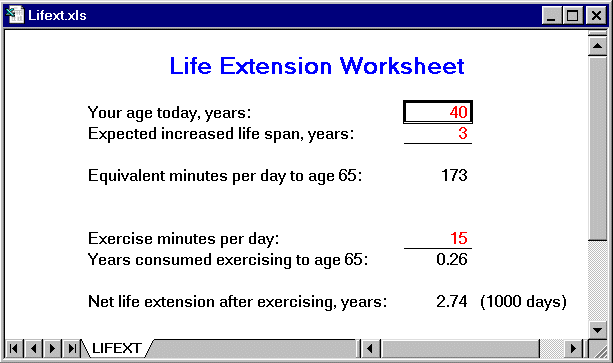source: Hacker's Diet, Exercise
Where is the evidence that doing 15 minutes exercise a day will increase life span by an extra 3 hours a day? Via NHS Direct gave a link to Bandolier.
Bandolier say "This site is for those of us who want to know that getting breathless is a good thing, but need assurance or reassurance that it has powerful benefits for our health now and in the future."
What, Me Exercise?
Those who do not find time for exercise now will have to find time for illness.Don't kid yourself into thinking that exercise, by itself, will make you lose weight. Consider the following activities, and the number of calories an average person burns per hour in each.
—The Earl of Derby, 1873
| Activity | Calories/hour |
|---|---|
| Walking | 300 |
| Bicycling | 300 |
| Aerobics | 400 |
| Swimming | 400 |
| Tennis | 500 |
| Basketball | 500 |
| Jogging | 700 |
| Tasty Treat | Calories |
|---|---|
| Peanut butter sandwich | 275 |
| Pizza (3 slices) | 500 |
| Big Mac | 560 |
So, don't exercise to try to burn off calories and lose weight. Unless you're a professional athlete or obsessed with sports, you're not likely to spend enough time exercising strenuously enough to make much of a difference. Exercise will help you lose weight in more subtle ways. Regular exercise increases your rate of metabolism: the number of calories you burn all the time. Plus, for many people, exercise actually reduces appetite.
But these are side effects: hardly reasons to start exercising. The real reasons to exercise are that you'll live longer and feel better. Let's consider the case for exercise from those standpoints.
Living longer
I was never much of a one for sports. Every time I played baseball, I got hit in the mouth with a ball or bat. Whenever I played football, I ended up with a mouthful of mud. Imagine my delight when I discovered that the physical education requirement at my college could be satisfied by playing ping pong or on the rifle range.After reaching that glorious stage in life when other people couldn't make me do things I'd rather not, the case against exercising seemed straightforward and overwhelmingly persuasive.
- Exercising consumed time.
- Exercising was not programming.
- Therefore, by exercising, less time was available for programming.
But is there a flaw in this argument after all? Indeed there is. The premises are correct, but the conclusion doesn't account for the fact that regular exercise will, in all likelihood, allow you to live longer. Let's look at the numbers.
This “Life Extension Worksheet” is provided as an Excel worksheet. You may want to load LIFEXT.XLS and plug in your own numbers to compare with mine. Directions for calculating increased lifespan by hand are given in the Pencil and Paper chapter.

But, if by exercising you manage to live 3 years longer, you're ahead by a total of two and three quarters years by age 65—1000 days. Your increased life span works out to an additional 172 minutes per day from age 40 through 65. Even after spending 15 minutes exercising, the life extension you can expect from getting into shape gives you what amounts to two and half more hours per day to do whatever you enjoy most! Even if you live only one additional year through physical fitness, you'll still end up with 270 more days by exercising.
Of course, we're talking percentages here; you could be run over by a truck tomorrow. But hey, if you're in shape you may dodge that truck!
Feeling better
Exercising not only gives you more time to live, it makes the time you live more enjoyable. You'll feel better, think straighter, sleep more soundly, and have more capacity and endurance for everything you wish to do. How much? It varies from person to person; the only way to experience the benefits is to start an exercise program and see for yourself.Fortunately, the payoff becomes apparent pretty early-on, particularly in a program like this one where you can always compare your current level of fitness with the much lower levels you strove to master only a few weeks before.
If you don't buy the “feeling better” argument, consider this. Virtually all medical evidence shows that if you don't exercise, you're more likely to suffer a heart attack or, if you're going to have one anyway, to have it earlier in life. Even if you're resolute in believing you won't feel one whit better from exercising, you'll certainly concede that you'll feel a whole lot worse after collapsing to the floor with a coronary. I've no direct experience with this particular unpleasantness from life's menu of surprises, but folks I've talked to who have are unanimous that it's best avoided. Those who dropped dead right away were unavailable for comment.

No comments:
Post a Comment